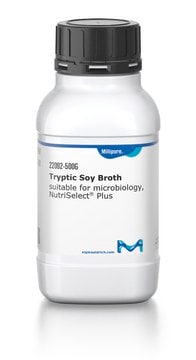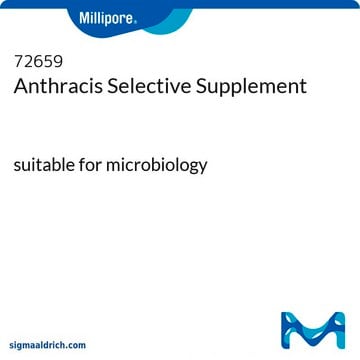05121
Heart Infusion Broth
NutriSelect® Plus, suitable for microbiology
Synonym(s):
HIB
About This Item
Recommended Products
sterility
non-sterile
Quality Level
form
powder
shelf life
limited shelf life, expiry date on the label
composition
beef heart (infusion from 500 g), 10 g/L
sodium chloride, 5.0 g/L
tryptose, 10.0 g/L
packaging
bottle of 500 g
manufacturer/tradename
NutriSelect® Plus
technique(s)
microbiological culture: suitable
color
light yellow
final pH
7.4±0.2 (25 °C)
application(s)
clinical testing
environmental
food and beverages
microbiology
suitability
nonselective for Escherichia coli
nonselective for Neisseria spp.
nonselective for Staphylococcus spp.
nonselective for Streptococcus spp.
nonselective for bacteria (General Media)
nonselective for coliforms
General description
Application
Features and Benefits
- Quality control with growth promotion test according to industry standards
- Quality assurance acc. to ISO 9001
- Cost-efficient powdered media
Preparation Note
Footnote
The designations basic, plus, or prime are added to indicate the quality control level, from basic quality control to standard QC plus to prime for full regulatory compliance.
Legal Information
Storage Class
11 - Combustible Solids
wgk_germany
WGK 3
flash_point_f
Not applicable
flash_point_c
Not applicable
ppe
Eyeshields, Gloves, type N95 (US)
Choose from one of the most recent versions:
Already Own This Product?
Find documentation for the products that you have recently purchased in the Document Library.
Customers Also Viewed
Articles
Streptococci- Overview of Detection, Identification, Differentiation and Cultivation Techniques
Our team of scientists has experience in all areas of research including Life Science, Material Science, Chemical Synthesis, Chromatography, Analytical and many others.
Contact Technical Service










